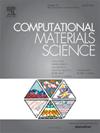Classification enhanced machine learning model for energetic stability of binary compounds
IF 3.1
3区 材料科学
Q2 MATERIALS SCIENCE, MULTIDISCIPLINARY
引用次数: 0
Abstract
As contemporary computational technologies and machine learning methodologies rapidly evolve, machine learning (ML) models for predicting formation enthalpies of materials exhibited convincible numerical precision and remarkable predictive efficiency, thus establishing a solid foundation for materials thermodynamic design. Despite achieving numerically high global probability accuracy, current ML models for formation enthalpy nonetheless exhibit suboptimal local accuracy within specific physical domain, which can be attributed to the misalignment between the physical constraints of chemical bonds and the critical descriptors capturing class-specific traits. Herein, we propose a novel approach to improve the local precision of the ML model for predicting formation enthalpy by utilizing Miedema theory-based classification, which segments data into distinct categories according to the electronegativity difference, electron density discontinuity and atomic size difference. Utilizing ML algorithms to build surrogate models guided by the classification strategy significantly improves the local predictive accuracy of formation enthalpy for specific binary compounds, significantly raising the R value from 0.4–0.9 to 0.8–0.9 compared to an unclassified method. Furthermore, feature importance analysis demonstrates that the pivotal factors for each category vary in some manner, highlighting the insufficiency of a sole ML model in classifying large-dimensional data, which can be addressed by adopting a physics-informed classification strategy. Our results suggest that employing physical-informed classification scheme into ML equips the models with broad applicability and local accuracy, which also shed light for other material properties predication.二元化合物能量稳定性的分类增强型机器学习模型
随着当代计算技术和机器学习方法的快速发展,用于预测材料形成焓的机器学习(ML)模型表现出令人信服的数值精度和显著的预测效率,从而为材料热力学设计奠定了坚实的基础。尽管目前的 ML 模型在数值上实现了较高的全局概率精度,但在特定物理域内却表现出不理想的局部精度,这可能是由于化学键的物理约束与捕捉类别特异性的关键描述符之间存在偏差。在此,我们提出了一种新方法,利用基于 Miedema 理论的分类法将数据按照电负性差异、电子密度不连续性和原子尺寸差异划分为不同的类别,从而提高 ML 模型预测形成焓的局部精度。在分类策略指导下利用 ML 算法建立代用模型,可显著提高特定二元化合物形成焓的局部预测精度,与未分类方法相比,R 值从 0.4-0.9 显著提高到 0.8-0.9。此外,特征重要性分析表明,每个类别的关键因素都有一定的差异,这凸显了单一 ML 模型在对大维度数据进行分类时的不足,而采用物理信息分类策略可以解决这一问题。我们的研究结果表明,在 ML 中采用物理信息分类方案可使模型具有广泛的适用性和局部准确性,这也为其他材料特性的预测提供了启示。
本文章由计算机程序翻译,如有差异,请以英文原文为准。
求助全文
约1分钟内获得全文
求助全文
来源期刊

Computational Materials Science
工程技术-材料科学:综合
CiteScore
6.50
自引率
6.10%
发文量
665
审稿时长
26 days
期刊介绍:
The goal of Computational Materials Science is to report on results that provide new or unique insights into, or significantly expand our understanding of, the properties of materials or phenomena associated with their design, synthesis, processing, characterization, and utilization. To be relevant to the journal, the results should be applied or applicable to specific material systems that are discussed within the submission.
文献相关原料
| 公司名称 | 产品信息 | 采购帮参考价格 |
|---|
 求助内容:
求助内容: 应助结果提醒方式:
应助结果提醒方式:


